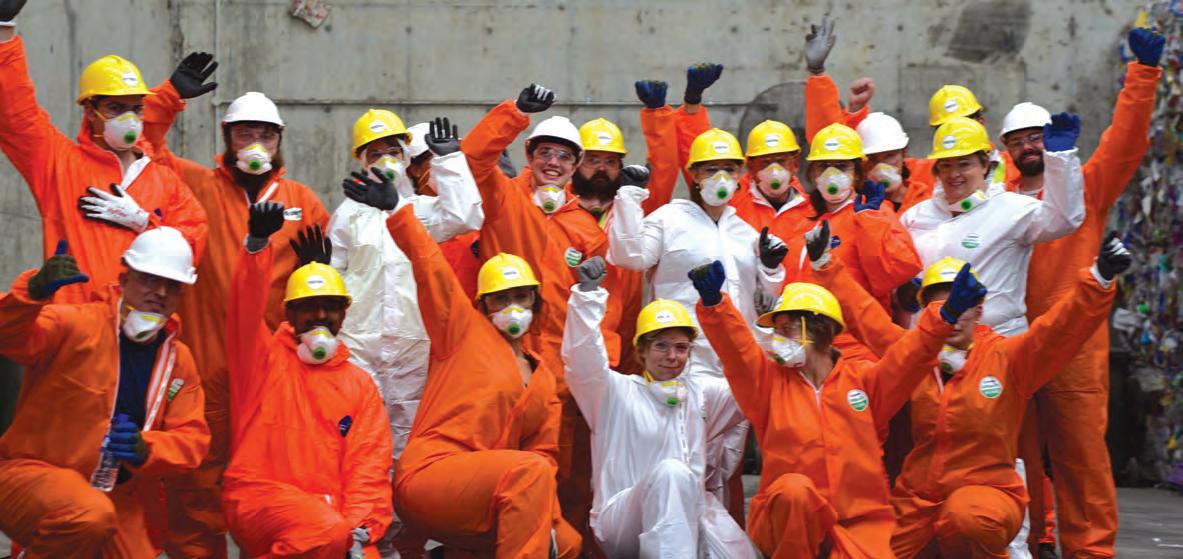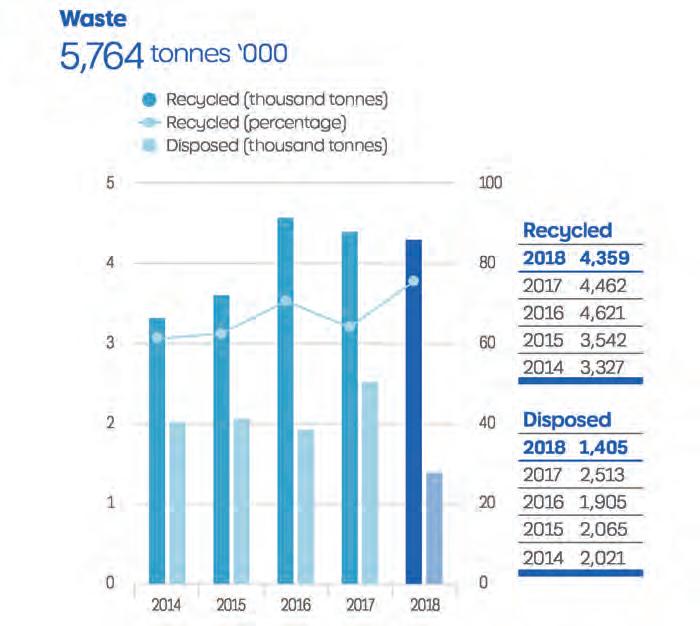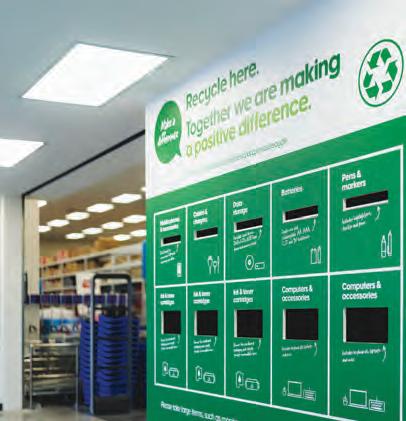
4 minute read
OFFICEWORKS TAKES CHARGE
Officeworks increased recycling rates from 64 per cent in FY17 to 81 per cent this financial year.
OFFICEWORKS’ RYAN SWENSON HIGHLIGHTS THE COMPANY’S SMART APPROACH TO BACK-OF-HOUSE AND CUSTOMER RECYCLING.
As a major supplier of office products and solutions for homes, businesses and schools, Officeworks’ customer footprint is by no means small. Its 168 stores buttress more than 8000 team members, in addition to three distribution centres and two support centres.
Developing an overarching sustainability plan therefore necessitated smarter thinking about how it manages its waste internally, using concrete data and drawing on waste industry experts to identify environmentally friendly solutions.
In 2015, Officeworks launched its first Positive Difference Plan, which set a five-year strategy and targets issues most pertinent to their stakeholders. The plan outlined goals to reduce the company’s environmental impact, sourcing products in sustainable and responsible ways and supporting the aspirations of its team and communities.
Four years into the 2020 plan, Officeworks has made significant progress against the targets, including reducing carbon emissions by 15 per cent.
As part of this, it is also working towards ensuring all paper products are either Forest Stewardship Council certified or made from 100 per cent recycled materials by December 2020.
The company follows the principles of the waste hierarchy, avoiding or reducing the amount of waste that is generated in the first place. From FY17 to FY18, it reduced its total waste generated from 6975 tonnes to 5764 tonnes. Of that, waste to landfill decreased from 2513 to 1405 tonnes.
Officeworks has also increased recycling rates from 64 per cent in FY17 to 81 per cent this financial year to date and is working towards a target to recycle 85 per cent by 30 June this year.
Ryan Swenson, Corporate Social Responsibility Manager at Officeworks, tells Waste Management Review that reducing the company’s environmental impact is a priority for the business, its team members and other stakeholders.
“Setting a long-term target to send zero waste to landfill, with milestones each year, enables us to establish a roadmap that demonstrates continuous improvement and to monitor our progress along the way,” he says.
To support its ambitious targets, Officeworks partnered with Cleanaway in 2017. The partnership allows Officeworks to provide detailed data and reporting to help its teams understand their progress against the targets.
Ryan says that Officeworks then looked at three areas where it could have the most influence: service schedules, infrastructure and behaviour change.
“By analysing the data, we made changes to the general waste collection schedules across selected stores from weekly to fortnightly.
“This drove an immediate change in behaviour as our teams needed
to ensure they had enough room in their general waste bin to last the fortnight,” he says.
He says that Officeworks looked at its infrastructure to ensure its stores had the right bins in the right places based on their waste streams.
“Thirdly, we put some of our team members through a waste and recycling workshop to help drive behaviour change at their stores,” Ryan says.
Over the past six months, team members from selected stores have conducted their own waste audits by spending a day offsite sorting through their own general waste bin, and then completing a cause and effect workshop to understand how recyclable waste entered the general waste bin and how to avoid it in the future.
Ryan says that this has been critical to imbedding a culture of zero waste to landfill and demonstrate that individual actions add up to make a big difference.
“Some stores have now moved their general waste collection to an on

call service since they are generating such little waste.”
Throughout March, more than 70 of its sites recycled at least 85 per cent of their waste, with many passing the 90 per cent mark – a testament to what is possible with the right initiatives and leadership.
To increase recycling rates at its support office, Officeworks has over the years implemented new recycling streams such as coffee cup recycling, organic waste collection and soft plastics recycling.
Ryan says that one of the highlights of the Positive Difference Plan is seeing how passionate its team members are to make a positive difference in their workplace.
As with any waste strategy, some challenges have sprung up.
Ryan says that Officeworks has a number of stores that have ongoing issues with illegal dumping.
To help address this, stores have moved their general waste bins to
Officework’s overall recycling data. Officeworks this year launched its largest ever recycling station at Mentone in Melbourne.

smaller bins that can be more easily moved into their receiving area each night.
With secondary packaging being a key input, Officeworks is focused on reducing the material used by optimising packaging sizes. It is moving to reusable solutions where possible, such as transit pallets, and working with suppliers to ensure all packaging is easily recyclable by removing materials from its supply chain such as polystyrene.
Officeworks takes a holistic approach when considering the environmental impact of the products it sells, which includes how they are disposed of at their end of life.
Throughout FY18, the company collected almost 700 tonnes of e-waste from its customers, which included ink and toner cartridges, computers and accessories, printers and mobile phones.
It also this year launched its largest ever recycling station at its Mentone Store in Melbourne that comprises recycling options for batteries, pens and markers.
To help its customers recycle, Officeworks developed the Australasian Recycling Label with Planet Ark in 2015 and it now features on over 3000 ownlabel products.





